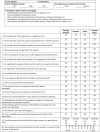Development of a brief instrument for assessing healthcare employee satisfaction in a low-income setting
- PMID: 24223878
- PMCID: PMC3818514
- DOI: 10.1371/journal.pone.0079053
Development of a brief instrument for assessing healthcare employee satisfaction in a low-income setting
Abstract
Background: Ethiopia is one of 57 countries identified by the World Health Report 2006 as having a severely limited number of health care professionals. In recognition of this shortage, the Ethiopian Federal Ministry of Health, through the Ethiopian Hospital Management Initiative, prioritized the need to improve retention of health care workers. Accordingly, we sought to develop the Satisfaction of Employees in Health Care (SEHC) survey for use in hospitals and health centers throughout Ethiopia.
Methods: Literature reviews and cognitive interviews were used to generate a staff satisfaction survey for use in the Ethiopian healthcare setting. We pretested the survey in each of the six hospitals and four health centers across Ethiopia (98% response rate). We assessed content validity and convergent validity using factor analysis and examined reliability using the Cronbach alpha coefficients to assess internal consistency. The final survey was comprised of 18 questions about specific aspects of an individual's work and two overall staff satisfaction questions.
Results: We found support for content validity, as data from the 18 responses factored into three factors, which we characterized as 1) relationship with management and supervisors, 2) job content, and 3) relationships with coworkers. Summary scores for two factors (relationship with management and supervisors and job content) were significantly associated (P-value, <0.001) with the two overall satisfaction items. Cronbach's alpha coefficients showed good to excellent internal consistency (Cronbach alpha coefficients >0.70) for the items in the three summary scores.
Conclusions: The introduction of consistent and reliable measures of staff satisfaction is crucial to understand and improve employee retention rates, which threaten the successful achievement of the Millennium Development Goals in low-income countries. The use of the SEHC survey in Ethiopian healthcare facilities has ample leadership support, which is essential for addressing problems that reduce staff satisfaction and exacerbate excessive workforce shortages.
Conflict of interest statement
Figures
Similar articles
-
Measuring job satisfaction among healthcare staff in the United States: a confirmatory factor analysis of the Satisfaction of Employees in Health Care (SEHC) survey.Int J Qual Health Care. 2017 Apr 1;29(2):262-268. doi: 10.1093/intqhc/mzx012. Int J Qual Health Care. 2017. PMID: 28339641
-
Health professionals' job satisfaction and associated factors at public health centers in West Ethiopia.Hum Resour Health. 2017 May 30;15(1):36. doi: 10.1186/s12960-017-0206-3. Hum Resour Health. 2017. PMID: 28558840 Free PMC article.
-
Impacts of working environment and benefits packages on the health professionals' job satisfaction in selected public health facilities in eastern Ethiopia: using principal component analysis.BMC Health Serv Res. 2019 Jul 16;19(1):494. doi: 10.1186/s12913-019-4317-5. BMC Health Serv Res. 2019. PMID: 31311540 Free PMC article.
-
[Psychometric characteristics of questionnaires designed to assess the knowledge, perceptions and practices of health care professionals with regards to alcoholic patients].Encephale. 2004 Sep-Oct;30(5):437-46. doi: 10.1016/s0013-7006(04)95458-9. Encephale. 2004. PMID: 15627048 Review. French.
-
[Development of a Reward Scale for Hospital Nurses].J Korean Acad Nurs. 2023 Oct;53(5):525-537. doi: 10.4040/jkan.23057. J Korean Acad Nurs. 2023. PMID: 37977563 Review. Korean.
Cited by
-
Work-related stress and associated factors among health professionals in zone 1, Afar region, Ethiopia.Heliyon. 2022 Dec 10;8(12):e12167. doi: 10.1016/j.heliyon.2022.e12167. eCollection 2022 Dec. Heliyon. 2022. PMID: 36531619 Free PMC article.
-
Determinants of academics' job satisfaction: empirical evidence from private universities in Bangladesh.PLoS One. 2015 Feb 20;10(2):e0117834. doi: 10.1371/journal.pone.0117834. eCollection 2015. PLoS One. 2015. PMID: 25699518 Free PMC article.
-
Use of a national collaborative to improve hospital quality in a low-income setting.Int Health. 2016 Mar;8(2):148-53. doi: 10.1093/inthealth/ihv074. Epub 2016 Jan 20. Int Health. 2016. PMID: 26796023 Free PMC article.
-
Retention of medical officers in district health services, South Africa: a descriptive survey.BJGP Open. 2022 Dec 20;6(4):BJGPO.2022.0047. doi: 10.3399/BJGPO.2022.0047. Print 2022 Dec. BJGP Open. 2022. PMID: 36167403 Free PMC article.
-
Understanding job satisfaction and motivation among nurses in public health facilities of Ethiopia: a cross-sectional study.BMC Nurs. 2019 Oct 15;18:46. doi: 10.1186/s12912-019-0373-8. eCollection 2019. BMC Nurs. 2019. PMID: 31636508 Free PMC article.
References
-
- WHO (2006) The World Health Report 2006: Working Together for Health. Geneva, Switzerland. - PubMed
-
- Elzinga G, Degu J, Gebrekidane M, Samrawit N (2010) Human Resources for Health Implications of Scaling Up For Universal Access to HIV/AIDS Prevention, Treatment, and Care: Ethiopia Rapid Situational Analysis. In: Group GHWATW, editor. Addis Ababa, Ethiopia.
-
- Dreesch N, Dolea C, Dal Poz MR, Goubarev A, Adams O, et al. (2005) An approach to estimating human resource requirements to achieve the Millennium Deelopment Goals. Health Policy and Planning 20: 267–276. - PubMed
-
- Kebede S, Mantopoulos J, Ramanadhan S, Cherlin E, Gebeyehu M, et al. (2012) Educating leaders in hospital management: a pre-post study in Ethiopian hospitals. Global Public Health 7: 164–174. - PubMed
-
- Initiative USGH (2011) Global Health Initiative: Ethiopia Strategy. Washington DC: US State Department
Publication types
MeSH terms
LinkOut - more resources
Full Text Sources
Other Literature Sources


